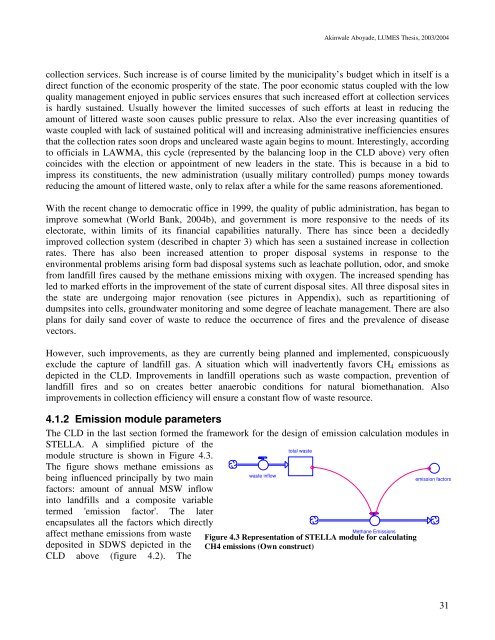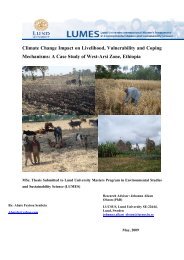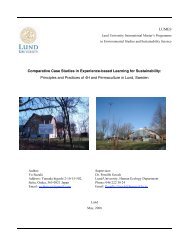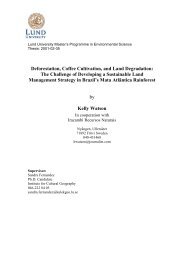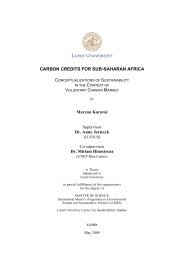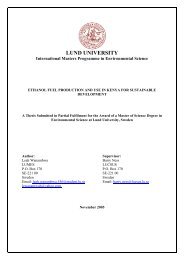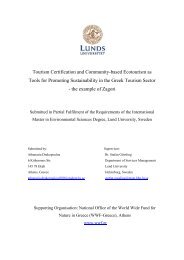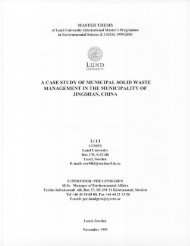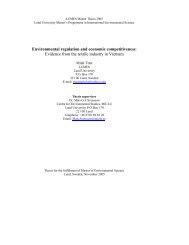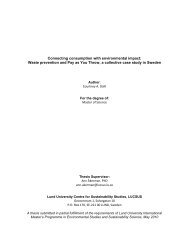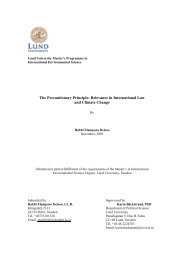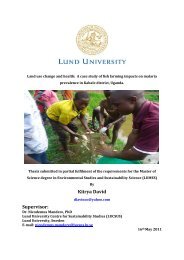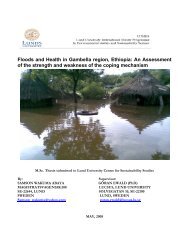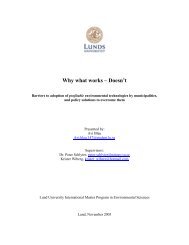Wale Aboyade's thesis - lumes
Wale Aboyade's thesis - lumes
Wale Aboyade's thesis - lumes
Create successful ePaper yourself
Turn your PDF publications into a flip-book with our unique Google optimized e-Paper software.
Akinwale Aboyade, LUMES Thesis, 2003/2004<br />
collection services. Such increase is of course limited by the municipality’s budget which in itself is a<br />
direct function of the economic prosperity of the state. The poor economic status coupled with the low<br />
quality management enjoyed in public services ensures that such increased effort at collection services<br />
is hardly sustained. Usually however the limited successes of such efforts at least in reducing the<br />
amount of littered waste soon causes public pressure to relax. Also the ever increasing quantities of<br />
waste coupled with lack of sustained political will and increasing administrative inefficiencies ensures<br />
that the collection rates soon drops and uncleared waste again begins to mount. Interestingly, according<br />
to officials in LAWMA, this cycle (represented by the balancing loop in the CLD above) very often<br />
coincides with the election or appointment of new leaders in the state. This is because in a bid to<br />
impress its constituents, the new administration (usually military controlled) pumps money towards<br />
reducing the amount of littered waste, only to relax after a while for the same reasons aforementioned.<br />
With the recent change to democratic office in 1999, the quality of public administration, has began to<br />
improve somewhat (World Bank, 2004b), and government is more responsive to the needs of its<br />
electorate, within limits of its financial capabilities naturally. There has since been a decidedly<br />
improved collection system (described in chapter 3) which has seen a sustained increase in collection<br />
rates. There has also been increased attention to proper disposal systems in response to the<br />
environmental problems arising form bad disposal systems such as leachate pollution, odor, and smoke<br />
from landfill fires caused by the methane emissions mixing with oxygen. The increased spending has<br />
led to marked efforts in the improvement of the state of current disposal sites. All three disposal sites in<br />
the state are undergoing major renovation (see pictures in Appendix), such as repartitioning of<br />
dumpsites into cells, groundwater monitoring and some degree of leachate management. There are also<br />
plans for daily sand cover of waste to reduce the occurrence of fires and the prevalence of disease<br />
vectors.<br />
However, such improvements, as they are currently being planned and implemented, conspicuously<br />
exclude the capture of landfill gas. A situation which will inadvertently favors CH 4 emissions as<br />
depicted in the CLD. Improvements in landfill operations such as waste compaction, prevention of<br />
landfill fires and so on creates better anaerobic conditions for natural biomethanation. Also<br />
improvements in collection efficiency will ensure a constant flow of waste resource.<br />
4.1.2 Emission module parameters<br />
The CLD in the last section formed the framework for the design of emission calculation modules in<br />
STELLA. A simplified picture of the<br />
module structure is shown in Figure 4.3.<br />
The figure shows methane emissions as<br />
being influenced principally by two main<br />
factors: amount of annual MSW inflow<br />
into landfills and a composite variable<br />
termed 'emission factor'. The later<br />
encapsulates all the factors which directly<br />
affect methane emissions from waste<br />
deposited in SDWS depicted in the<br />
CLD above (figure 4.2). The<br />
waste inflow<br />
total waste<br />
Methane Emissions<br />
Figure 4.3 Representation of STELLA module for calculating<br />
CH4 emissions (Own construct)<br />
emission factors<br />
31


